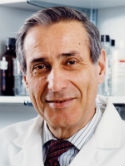Enhancement of soft tissue sarcoma response to gemcitabine through timed administration of a short-acting anti-angiogenic agent Journal Article
| Authors: | Cheng, J.; Fuller, J.; Feldman, R.; Tap, W.; Owa, T.; Fuks, Z.; Kolesnick, R. |
| Article Title: | Enhancement of soft tissue sarcoma response to gemcitabine through timed administration of a short-acting anti-angiogenic agent |
| Abstract: | BACKGROUND/AIMS: Despite enormous effort, anti-angiogenic drugs have not lived up to the promise of globally-enhancing anti-cancer therapies. Clinically, anti-angiogenic drugs have been used to persistently suppress vascular endothelial growth factor (VEGF) in order to "normalize" dysfunctional neo-angiogenic microvasculature and prevent recruitment of endothelial progenitors. Recently, we showed that a 1h pre-treatment with anti-angiogenic drugs prior to ultra-high single dose radiotherapy and specific chemotherapies transiently de-represses acid sphingomyelinase (ASMase), leading to enhanced cancer therapy-induced, ceramide-mediated vascular injury and tumor response. Here we formally decipher parameters of chemotherapy induction of endothelial sphingolipid signaling events and define principles for optimizing anti-angiogenic chemosensitization. METHODS: These studies examine the antimetabolite chemotherapeutic gemcitabine in soft tissue sarcoma (STS), a clinically-relevant combination. RESULTS: Initial studies address the theoretic problem that anti-angiogenic drugs such as bevacizumab, an IgG with a 3-week half-life, have the potential for accumulating during the 3-week chemotherapeutic cycles currently standard-of-care for STS treatment. We show that anti-angiogenic ASMase-dependent enhancement of the response of MCA/129 fibrosarcomas in sv129/BL6 mice to gemcitabine progressively diminishes as the level of the VEGFR2 inhibitor DC101, an IgG, accumulates, suggesting a short-acting anti-angiogenic drug might be preferable in multi-cycle chemotherapeutic regimens. Further, we show lenvatinib, a VEGFR2 tyrosine kinase inhibitor with a short half-life, to be superior to DC101, enhancing gemcitabine-induced endothelial cell apoptosis and tumor response in a multi-cycle treatment schedule. CONCLUSION: We posit that a single delivery of a short-acting anti-angiogenic agent at 1h preceding each dose of gemcitabine and other chemotherapies may be more efficacious for repeated sensitization of the ASMase pathway in multi-cycle chemotherapy regimens than current treatment strategies. © Copyright by the Author(s). Published by Cell Physiol Biochem Press. |
| Keywords: | chemotherapy; endothelial cells; ceramide; asmase; anti-angiogenic |
| Journal Title: | Cellular Physiology and Biochemistry |
| Volume: | 54 |
| Issue: | 4 |
| ISSN: | 1015-8987 |
| Publisher: | Cell Physiol Biochem Press |
| Date Published: | 2020-01-01 |
| Start Page: | 707 |
| End Page: | 718 |
| Language: | English |
| DOI: | 10.33594/000000250 |
| PUBMED: | 32722909 |
| PROVIDER: | scopus |
| PMCID: | PMC8567213 |
| DOI/URL: | |
| Notes: | Article -- Export Date: 1 September 2020 -- Source: Scopus |
Altmetric
Citation Impact
BMJ Impact Analytics
Related MSK Work









